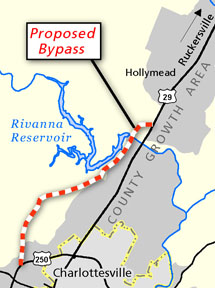At their June meeting, the Albemarle Board of Supervisors voted 4-2 to reverse the County’s long-held opposition to the Western Bypass–a $250-350 million project that VDOT studies have shown would not reduce traffic congestion on Rt. 29 North
Apparently won over by a phone call from Virginia Secretary of Transportation Sean Connaughton, the Board of Supervisors voted to ask the Metropolitan Planning Organization–a planning body with representatives from the City, the County and VDOT–to remove language blocking the allocation of federal funds to construct the bypass.
Reasons the Western Bypass is a Bad Idea:

- The project would not work to alleviate congestion. VDOT studies show that only 12% of the traffic on the bypassed stretch of road is through-traffic, so the proposed bypass would not significantly improve local traffic problems.
- The estimated cost of the bypass is between $250-350 million dollars.
- It would likely compete for funding with the transportation priorities laid out in the approved Places29 plan.
- It would cross through 8 neighborhoods* and take over 40 residences.
- It would impact several local schools, including STAB Lower & Middle Schools, Albemarle High School, Jouett Middle School, Greer and Agnor-Hurt Elementary Schools, and Ivy Creek School. Including taking 15 acres of school property at the AHS/Jouett/Greer/Ivy Creek complex. Due to the proximity of the proposed Western Bypass to these local schools, citizens are concerned with the potential impact on children’s respiratory health. Read a statement by area resident Donna Vande Pol.
- It would increase the risk to our public water supply at the South Fork Rivanna Reservoir.
Summed up in a 2002 letter from Albemarle County to then Governor Mark Warner regarding the Western Bypass: “it is ill-advised to move forward with this project, which is immensely expensive, environmentally damaging, and does not serve a legitimate transportation function, according to the State’s traffic studies.”
>> See a zoomed in map of the potential impact in and around Forest Lakes.
PEC will be closely involved in these issues, and we’ll keep you informed about opportunities for input. If you have any questions, please contact PEC’s Albemarle & Charlottesville Land Use Officer, Jeff Werner, at [email protected] or 434-977-2033 x. 29.
Excerpt froms VDOT Study:
Joint Legislative Audit and Review Commission of the Virginia General Assembly Review of the Highway Location Process in Virginia, House Document No. 60, January 15, 1998.
Using the model that was developed based on the origin destination study as well as other data, the consultant analyzed each of the alternatives under consideration. The analysis revealed that none of the bypass alternatives would have much impact on the level of service on existing Route 29 in the long term. The analysis indicated that if any of the bypass alternatives alone were constructed, the level of service (LOS) on existing Route 29 would be at “F” in the year 2010. VDOT rates the level of service that a road provides. A level of service of “A” is the highest level that a road can provide and “F” is the worst rating a road can receive. LOS ratings of “E” and “F” are generally considered unacceptable by VDOT unless land use and development make it impossible to construct new facilities.
The consultant study also examined the impact on the LOS that the three grade-separated interchanges would have using the traffic model that was developed. This analysis revealed that the combination of widening existing Route 29 and constructing the three grade-separated interchanges, without construction of a bypass, would increase the Level of Service on existing Route 29 from an “F” to a “B” in the year 2010. The study further found that if both the interchanges and a western bypass were constructed in addition to the widening, that the LOS would improve from an “F” to an “A” level of service in the year 2010. The study projected that the cost of a bypass would be from $98 million to $198 million and the cost of the three interchanges would total approximately $45 million.
The complete document can be viewed on-line at: http://jlarc.state.va.us/Reports/Rpt213.pdf
Additional Resources
- 2002 Letter from Albemarle County expressing firm opposition to the Western Bypass.
- 1990 Traffic and Transportation Analysis for the Rt. 29 Corridor
